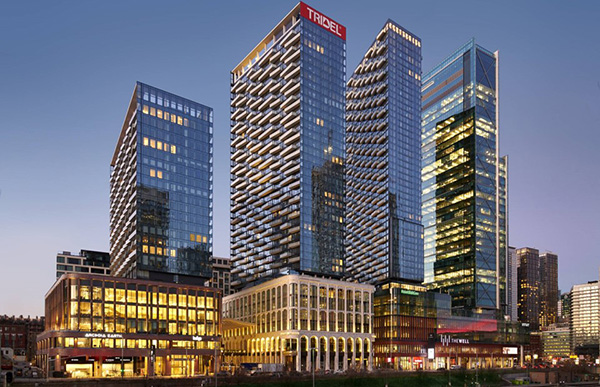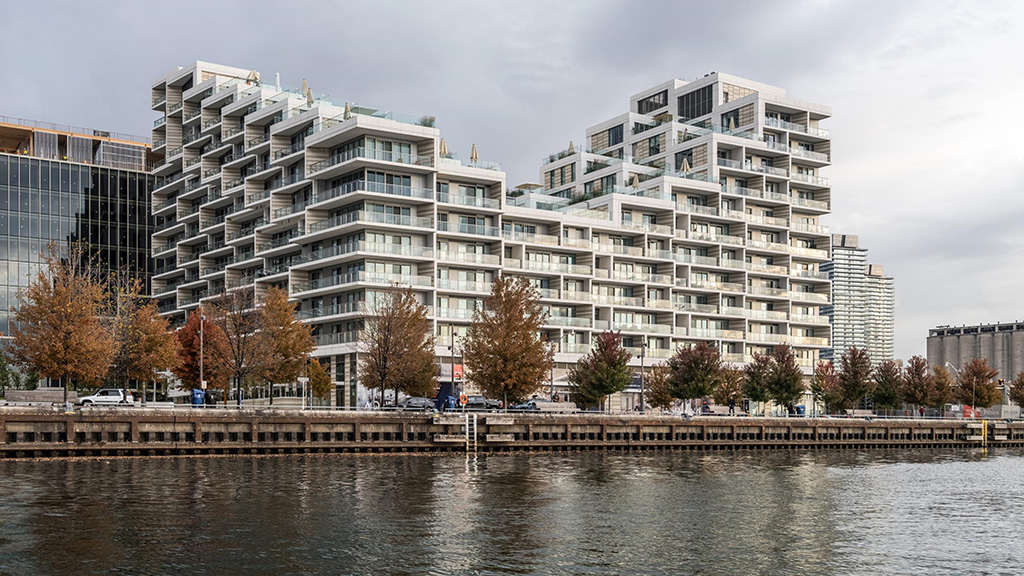may be one of Canada’s largest homebuilders today but the company started out as a family business and, over its 90-year history, has held onto the core values that it started off with.
“I know everybody likes the word ‘developer,’ but we tend to, because of our roots, think of ourselves as a homebuilder,” said Jim Ritchie, president of Tridel. “It doesn’t really matter whether the home is a single-family house, a townhome or a condominium in a mid- or highrise building, it’s still somebody’s home, so that’s our focus.”
Humble beginnings
The company was founded by Jack DelZotto in 1934 who immigrated from Italy to Ontario and worked as a stone mason and bricklayer. He built the first home in the Bloor-Dufferin area of Toronto.
In the 1950s, Tridel transitioned from predominantly single-family home construction to small apartment buildings.
Eventually Jack’s sons Angelo, Elvio and Leo DelZotto got involved in the business, along with Harvey Fruitman, and the company grew into one of the largest real estate groups with several operating companies focused on diverse areas from development and sales to construction and property management.
The in the ‘60s, the company expanded into highrise residences.
“It was in the late ‘60s that the provincial government created the first Condominium Act that enabled this new form of housing, so there was an opportunity there that not everybody understood,” Ritchie explained. “It was a different form of ownership. It clearly could be more affordable than a house.”
Tridel built its first condominium building in Oakville in the late ‘60s.
“This really started to put in place the framework for what Tridel would be today,” Ritchie said.
“Along that journey there were shopping malls, all kinds of things…but the focus certainly into the ‘80s became more and more on highrise condos and effectively that’s what we do exclusively today.”

High-profile highrises
Tridel has been involved with some of the most notable communities in the Greater Toronto Area, including The Well, Bayside Toronto, Ten York, 10 Bellair, Alexandra Park, Metrogate, Harbourwalk at Lakeview Village, Hullmark Centre, Polo Club and Governor’s Hill.
The homebuilder has delivered over 90,000 homes, comprising more than 200 condominium communities.
“Specializing in that one particular element, being the highrise home, I think has served us well over the decades,” Ritchie said, adding the company’s DNA was solidified with some of the first condo developments. “Today, if you look at what’s going on in the GTA in terms of intensification and the number of people who move here, this is a built form that’s needed to supply housing as we go forward. It can’t just be traditional single-family houses or other built forms.”

Addressing the housing crisis
Over the years, Tridel has won a number of awards including Home Builder of the Year by the (BILD), High-rise Builder of the Year by and earned BILD’s Green Builder award 15 times.
Innovation and sustainability have become an important part of Tridel’s mission as the company focuses on reducing carbon emissions and identifying opportunities for optimizing energy efficiency.
“The building technologies, the building envelopes, the structure all of this are things that over time we in our industry have refined,” Ritchie said.
One example is the design of the suites themselves.
“Over the years, to make them more affordable they got smaller, which means you had to look at design elements differently,” said Ritchie. “The size of kitchens, there are more open spaces and less rooms to make the home more spacious…The whole issue with energy efficiency and improving the mechanical systems, the electrical systems in the building and just giving a better experience for the homeowner in terms of how some of those elements are controlled. All these things have evolved considerably.”
Going forward, the company will continue to focus of innovation in design and building practices, but that will not be its only focus. More supply will be needed to deal with the housing crisis.
“The bigger picture is that intensification is going to continue to play a big role in housing and the type of built form that we do,” Ritchie pointed out. “Whether it’s a midrise or a highrise, the concept of a condominium home is not new anymore. It can work for single people. It can work for couples without children, but the suites can be designed and are being designed today for families. There are many opportunities.
“At scale the only form of housing we’re going to be able to build is going to be different forms of higher density, so I think we’re well positioned to take advantage of that for decades to come.”
Follow the author on X/Twitter .




Recent Comments
comments for this post are closed